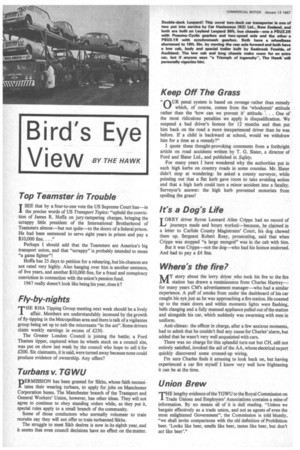Bird's Eye
Page 52

If you've noticed an error in this article please click here to report it so we can fix it.
ViewBY THE HAWK
Top Teamster in Trouble
T SEE that by a four-to-one vote the US Supreme Court has—in 1 the precise words of US Transport Topics: "upheld the conviction of James R. Hoffa on jury-tampering charges, bringing the scrappy little president of the International Brotherhood of Teamsters almost—but not quite—to the doors of a federal prison. He had been sentenced to serve eight years in prison and pay a $10,000 fine. . . ."
Perhaps I should add that the Teamsters are America's big transport union, and that "scrappy" is probably intended to mean "a game fighter"!
Hoffa has 25 days to petition for a rehearing, but his chances are not rated very highly. Also hanging over him is another sentence, of five years, and another $10,000 fine, for a fraud and conspiracy conviction in connection with the union's pension fund.
1967 really doesn't look like being his year, does it?
Fly-by-nights
THE RHA Tipping Group meeting next week should be a lively affair. Members are understandably incensed by the growth of fly-tipping in the Metropolitan area and there is talk of a vigilantes group being set up to nab the miscreants "in the act". Some drivers claim weekly earnings in excess of £250.
The Greater London Council is joining the battle; a Ford Thames tipper, captured when its wheels stuck on a council site, was put on show last week by the council who hope to sell it for £200. Six claimants, it is said, were turned away because none could produce evidence of ownership. Any offers?
Turbans v. TGWU
pERMISSION has been granted for Sikhs, whose faith necessitates their wearing turbans, to apply for jobs on Manchester Corporation buses. The Manchester branch of the Transport and General Workers' Union, however, has other ideas. They will not agree to continue to obey standing orders while, as they put it, special rules apply to a small branch of the community.
Some of those conductors who normally volunteer to train recruits say they will not offer to train turbanned Sikhs.
The struggle to meet Sikh desires is now in its eighth year, and it seems that even council decisions have no effect on the matter.
Keep Off The Grass
"OUR penal system is based on revenge-rather than remedy which, of course, comes from the 'whodunnit' attitude rather than the 'how can we prevent it' attitude. . . One of the most ridiculous penalties we apply is disqualification. We suspend a bad driver's licence for 12 months and then put him back on the road a more inexperienced driver than he was before. If a child is backward at school, would we withdraw him for a time as a remedy?"
I quote these thought-provoking comments from a forthright article on road accidents written by T. G. Slater, a director of Ford and Slater Ltd., and published in Safety.
For many years I have wondered why the authorities put in such high kerbs on country roads in some counties. Mr. Slater didn't stop at wondering: he asked a county surveyor, while pointing out that a flat kerb gave room to take avoiding action and that a high kerb could turn a minor accident into a fatality. Surveyor's answer: the high kerb prevented motorists from spoiling the grass!
It's a Dog's Life
LORRY driver Byron Leonard Allen Cripps had no record of journeys made and hours worked—because, he claimed in a letter to Carlisle County Magistrates' Court, his dog chewed them up. Sergeant Robert Reay, prosecuting, said that when Cripps was stopped "a large mongrel" was in the cab with him.
But it was Cripps—not the dog—who had his licence endorsed. And had to pay a £4 fine.
Where's the fire?
MY story about the lorry driver who took his fire to the fire station has drawn a reminiscence from Charles Hartreyfor many years CM's advertisement manager—who had a similar experience. A puff of smoke from under the dashboard of his car caught his eye just as he was approaching a fire station. He coasted up to the main doors and within moments lights were flashing, bells clanging and a fully manned appliance pulled out of the station and alongside his car, which suddenly was swarming with men in uniform.
Anti-climax: the officer in charge, after a few anxious moments, had to admit that he couldn't find any cause for Charles' alarm, but added that he wasn't very well acquainted with cars.
There was no charge for this splendid turn-out but CH, still not entirely satisfied, invoked the aid of the AA, whose electrical expert quickly discovered some crossed-up wiring.
I'm sure Charles finds it amusing to look back on, but having experienced a car fire myself I know very well how frightening it can be at the time.
Union Brew
THE lengthy evidence of the TGWU to the Royal Commission on Trade Unions and Employers' Associations contains a mine of information. By no means all of it is dull reading. "Unless we bargain effectively as a trade union, and not as agents of even the most enlightened Government", the Commission is told bluntly, "we shall invite comparisons with the old definition of Prohibition beer. 'Looks like beer, smells like beer, tastes like beer, but don't act like beer'."








































































































